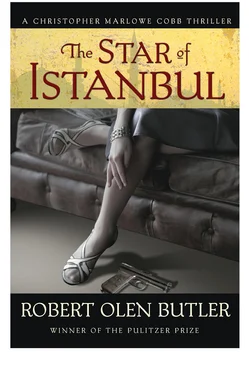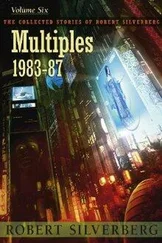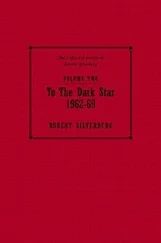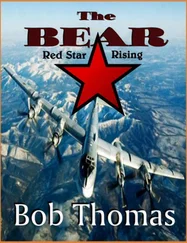The admiral had departed from our company soon after the handshake, but in the few parting words he’d referred to Metcalf as “Gentleman Jim.” So as Metcalf and I took our first drag of our second cigarette together, Queenstown now simply stacks and hedgerows of rooftops and a scattering of harbor-front lights below us, I said, “‘Gentleman Jim,’ is it? From the boxer?” Meaning the former heavyweight champion Gentleman Jim Corbett.
“Do you have a taste for irony, Mr. Cobb?”
“Kit. From the playwright,” I said.
“Kit,” he said.
“Sure,” I said. “I like a good irony.”
“Yes, from the boxer, thanks to the ambassador and his fondness for the prizefights. But I am among the least violent of men.”
“A gentleman,” I said.
“An irony within an irony,” he said.
We concentrated on smoking for a little while. Or I did, at least. The tobacco was smoothing a few of the day’s jagged edges in my head. I took a deep drag and let it go with a long exhalation, and I did that once more. Metcalf simply watched me as he let his own cigarette smolder between fore and middle fingers, suspended near his face with his elbow on the arm of his chair.
Like a real gentleman.
After the second long pull on my Captsan, I said, “So what are we authorized to say to each other?”
“Whatever you would say to your stateside James.”
I nodded, but for now I quietly took another drag on the cigarette.
“At this point,” Metcalf said, “it might merely be moot, but were you able to learn anything about our man Walter Brauer?”
“The most recent thing I learned is that it’s not moot,” I said.
Metcalf straightened a bit in his chair. He seemed suddenly to become aware of his cigarette. He flicked the long ash and took a drag. “So he’s alive?”
“He is.”
“What were the earlier things?”
“His business is with Miss Selene Bourgani.”
This brought Metcalf forward in his chair. “The film actress?”
“That’s right.”
“Are you sure?”
I told him the events on the ship. Many of them. I told him about finding out the connection between Bourgani and Brauer after suspecting an American bookseller. I told him about Nuttall and the coded message and the planned delivery of something — likely the actress — to the address on St. Martin’s Lane on Monday night. I told him about Brauer’s personal interest in the seller of books, the necessary secrecy of it being a potential point of leverage with the man.
I told Metcalf nothing of my own personal interest in Selene. Or of hers in me. Like I was a real gentleman. I also kept the anonymous German film director to myself for now; it was too vague anyway, and I didn’t want to have to explain how I came to know about him.
I told my story and then I said, “She’s in the Queen’s Hotel.”
“And Brauer?”
“I don’t know where he’s staying. But from the look of them on the ship, if we know where she is, we’ll soon find him.”
Metcalf rose from his chair. “I’ll wire our man in Washington for instructions.”
“And Bourgani?”
“We’ll see what our instructions are. But in the meantime I’ve got a local here who can keep an eye on her.”
I stood up as well. “I need a couple of things right away. For my public self. The war correspondent.”
“Of course,” Metcalf said. “You’ve happened upon a story, it seems.”
“It happened upon me,” I said.
For the following two hours, in an office papered in war maps, I banged at a clumsy old Imperial Model A with a curved keyboard and a downstrike type bar. My body wanted badly to collapse after the events of what was now the previous day, but a pot of coffee kept me afloat like a kapok-filled life jacket, and I wrote a hell of a front-page, king-beat, firsthand, exclusive story about the sinking of the Lusitania . The Admiralty’s Marconi man even transmitted it for me to the Post-Express at what was fifteen minutes past nine in the evening, Chicago time. We’d miss the morning bulldog edition, which had to be leading with the worst possible hobo mulligan of a Lusitania story, full of wire bits and speculations and anti-German fulminations, but this one would be way ahead of the other stories, the real stories, even with Trask needing to sign off on it, per his agreement with Griswold.
I had a copy sent directly to Trask in Washington as well. And I just gave all of them straight facts and some war correspondent derring-do. I was that kind of reporter anyway, believing the inevitable anti-German fulminations should be printed on the editorial page, not on the news pages. And as of a day before yesterday, Germany was still happy to let American reporters into Berlin to hear their side of things. Trask had always expected me to end up in der Vaterland, and if I stayed objective about this murderous sucker punch they’d delivered, it might make things go easier for me. The facts spoke for themselves anyway.
Among the facts, however, were none about the film actress I saved along with myself. That was her story to tell, if she was of a mind to.
And then I finally got to bed in an upper-floor officer guest room. I did a lot of heavy-legged, slant-decked, wave-lapped running in my dreams, and I woke in a sweat before dawn. I got up and walked around and around the room, happy to have an even-keeled floor and dry feet. But what was floating and moaning in my head in my waking state was a thing I’d done and totally forgotten about till now: coldcocking that junior officer on the bridge of the Lusitania . Did he wake up in time to save himself? Did he wake up in time and with a clear enough head? Did he die because of me? If he did, that was too bad. But I’d necessarily figured at that moment, given what he was trying to insist on, that it was either him or me. No. It was either him or me and Selene. I did what I had to do. He shouldn’t have been blindly enforcing a wrongheaded order in a stupidly literal way at a time like that. He should have let us pass on by.
I slept some more and woke to James Metcalf making an ungentlemanly door-banging entrance into my room. He had a large, leather Gladstone bag and a couple of tailored suits and big plans for me. He pointed out that the bright light outside was being provided by a well-risen sun.
“How well, exactly?” I asked.
“Nearly ten o’clock well,” he said.
I was sitting now on the side of the bed and had found the floor with my feet, a simple act that I realized was registering in me as a great relief.
Metcalf set down my new bag and laid out my two new suits on the bed next to me. He said, “You need to dress quickly. We have to get you to Kingstown by this evening. Which means by automobile.”
“What’s in Kingstown?”
“Bourgani and Brauer. They rented the hotel owner’s auto and hired a driver and took off an hour ago. They’re crossing the channel tonight to catch the train to London from Holyhead at one-thirty tomorrow morning.”
“And so am I.”
“And so are you.”
“They still want to make that Monday delivery.”
“So it seems.”
“Did you hear from Trask?”
“He said to keep doing what you’re doing, at least for now. Follow and observe. Our boys are looking into the film star, and we may know more about her by the time you get to London. You’re at the Waldorf. We don’t know where Bourgani will be. Follow and observe. But we’ve got the address of Brauer’s flat.”
Metcalf pulled an envelope from his inside coat pocket and handed it to me. “What we know is in here. If things happen quickly, just go to the embassy and identify yourself and ask for Smith. If Smith’s out, the front desk is secure. You can leave a message in a sealed envelope. I’ll be in London about twenty-four hours after you. I’ve given you some new documents as well. I presume yours are damp.”
Читать дальше












